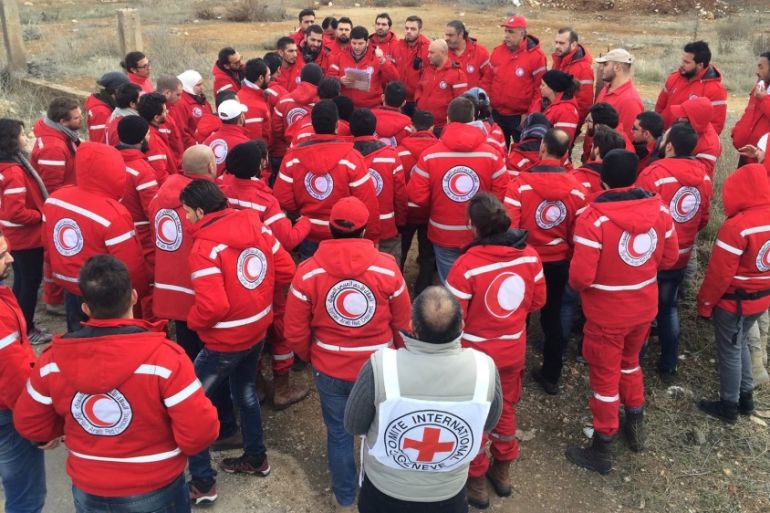Time for an aid revolution for Syrians and others
We must start planning for the next Syrian generations today.

So here we go again. Nearly five years into Syria’s gruelling civil war, and states gathered once more to work out how they were going to fund its humanitarian fallout – this time to the tune of some $9bn.
There is no small amount of sad irony that the London conference came a day after the suspension of the nascent Syrian peace talks. The United Nations assessment of the number of people in need of aid in Syria grew to 13.5 million in 2015 and it looks as if the international focus will now be on dealing with the consequences of war rather than the causes.
Keep reading
list of 4 itemsWhy Egypt backed South Africa’s genocide case against Israel in the ICJ
US sanctions two RSF commanders as fighting escalates in Sudan’s Darfur
Israel’s war on Gaza updates: 600k displaced from Gaza since May 6 – UN
The consequences are still hard to believe. Since the start of the Syria crisis, average life expectancy has fallen by 20 years. Syrians make up a fifth of all global homeless, and since 2011 50 Syrian families have been displaced every hour of every day.
However, in addition to the writing of large cheques, this humanitarian moment represents a chance for states to fundamentally alter the role, rights and future for refugees fleeing from war. We are, after all, living in a new age of refugees, with more people displaced by conflict than at any other time since World War II.
What is more, the average time now spent as a refugee is 17 years, and there needs to be a practical recognition of the protracted nature of this status. Record-breaking sums of money alone cannot effectively address this.
The British Development Secretary, Justine Greening, described the current situation well, criticising the systems of aid as not for purpose in the modern day: “The way the humanitarian system works at present is a bit like a health service which only has an accident and emergency department.”
While the role of blankets and emergency food rations have their place, the fallout from the Syrian conflict should prompt a more serious look at more sustainable options going forward. Indeed, there needs to be a paradigm shift in the nature of humanitarian infrastructure in order to meet with the realities of today.
There is a need for a new international consensus and agreement as to how aid should be used with civilian protection placed at the forefront.
Work, for example, is a key area of concern and potential. Changing employment laws to allow refugees to work legally could bring the refugees hope, dignity and financial security as well as improving the economies of the host countries.
It also offers a more sustainable solution than creating aid dependency in the shadow of conflicts that could go on for generations. Indeed, according to the Turkish Family and Social Policies Minister Sema Ramazanoglu, 85 percent of the nearly three million Syrian refugees currently residing in Turkey do not wish to return to their homeland under the current circumstances.
A coalition of more than 90 humanitarian and human rights groups – including Amnesty International, Oxfam and the Malala Foundation – have called for better access to education and jobs for refugees in Syria and neighbouring states.
New ideas of how to integrate Syrian refugees abroad are being explored. This week Physicians for Human Rights called for Syrian medics to be allowed to temporarily practise in neighbouring countries to which they have fled.
OPINION: Has the West betrayed the Syrian people?
Others are looking to create “employment zones” where the famous Syrian entrepreneurial spirit can be harnessed, refugees can work and investors are given tax exemptions, so the effect of legalising employment is managed and domestic labour is protected. In addition, local councils inside Syria are being supported with vocational and empowerment programmes.
Meanwhile, there needs to be a serious revision of aid delivery mechanisms at the highest level. The Assad regime is ignoring three-quarters of all UN requests to deliver aid in Syria. Of 113 requests from the UN to provide inter-agency aid convoys, only 10 percent were allowed to reach their destination. There is a need for a new international consensus and agreement as to how aid should be used with civilian protection placed at the forefront.

“Syrians are facing a war without law and a war without end,” said David Miliband, President and CEO of the International Rescue Committee, recently. If the problem of the future of Syria is too difficult to countenance, then the focus should be on the future of Syrians themselves.
We must start planning for the generations of tomorrow’s Syrians today. To do this a transformational rather than business-as-usual approach is an absolute necessity.
James Denselow is a writer on Middle East politics and security issues and a research associate at the Foreign Policy Centre.
The views expressed in this article are the author’s own and do not necessarily reflect Al Jazeera’s editorial policy.
